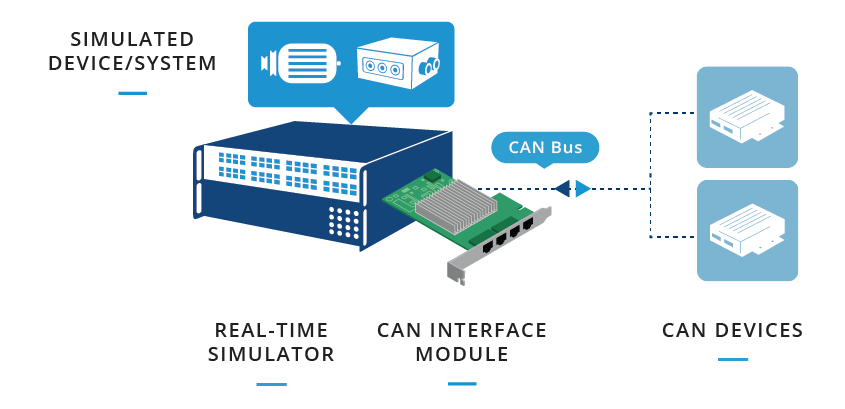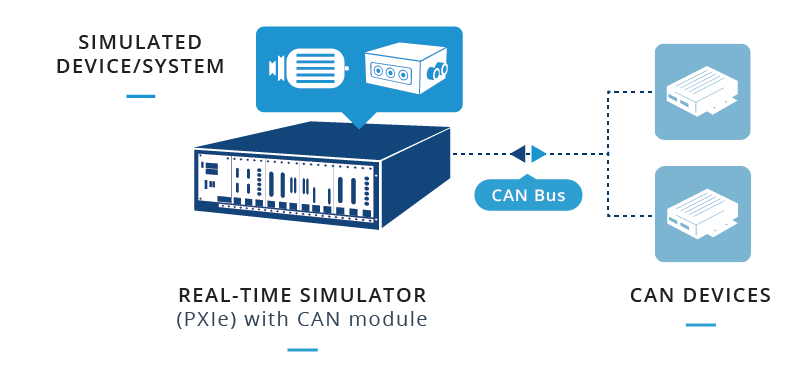Page Content
Have a question or need help?
Solution
OPAL-RT offers an integrated CAN solution using a standard KVaser 4 Channel PCie card allowing your real time simulator to interface with any peripheral CAN Device. CAN-FD (Flexible Data) is also supported. The driver is inherent to RTL-AB and has an easy-to-use interface that allows you to add, define, and manipulate channels, buses and messages. Furthermore, there is a built-in recording feature allowing the user to capture data throughout the simulation. If the user has already defined a CAN bus architecture, this can also be imported onto the driver using the CANdb Import tool, which supports .dbc and ARXML files. Channel and message data points would be made available to connect to your model via OpInputs and OpOutput blocks. The CAN driver gets initialized once the simulation is loaded onto the target. Furthermore, CAN is supported on the NI Platform via a range of cards or modules that are offered. Using the NI-XNET driver allows the user to communicate with external CAN devices in real-time. FIBEX (Fieldbus Exchange Format) or .dbc files can also be imported to set up the CAN architecture. For the CANopen protocol on the RT-LAB platform, a GATEWAY solution is required. The gateway is provided by Anybus X-gateway CANopen that makes it possible to communicate with peripheral CANopen devices. The way it is implemented, is that the OPAL-RT simulator communicates with the gateway using the ModBus Protocol over an Ethernet cable. The Anybus gateway will output the CANopen signal over a DB9 connector. |
CAN is a robust protocol used in the automotive industry to allow microcontroller devices to talk with a master/host device. It's a messaged based protocol meaning, i.e. the slave device will translate the message into some form of action. The messages are also sent sequentially throughout the whole CAN bus. The CAN bus is seen as the whole architecture where the master and the slave devices are connected. |


Software Platform Compatibility
Product Selection Guide
RT-LAB
The RT-LAB CAN driver requires a CAN bus interface kit to be added to the Real-Time Simulator. The OP3411 kit includes a Kvaser CAN PCIe card and a software license, which support up to 4 CAN channels.
For additional CAN channels, additional kits may be added if PCIe slots are available.
Type | Description | Product Number(s) | Supported Simulators | |||
|---|---|---|---|---|---|---|
OP4510v2 | OP5033XG | OP5600v2 | OP5700 | |||
Driver | Driver license for CAN/CAN-FD/CANopen for RT-LAB, 4 channels. Included with all CAN bus Interface Kits. | OP3414 | YES | YES | YES | YES |
Add-on module | CAN bus Interface Kit, KVASER PCIe CAN 4 channels for OP451x Series* | OP3411-4510 | OP4510v2 | |||
CAN bus Interface Kit, KVASER PCIe CAN 2 channels for OP451x Series* | OP3411-451x-2CH | OP4510v2 | ||||
CAN bus Interface Kit, KVASER PCIe CAN 4 channels for OP4610XG* | OP3411-451x-4CH | OP4610XG | ||||
CAN bus Interface Kit, KVASER PCIe CAN 4 channels for OP5600* | OP3411-5600 | YES | ||||
CAN bus Interface Kit, KVASER PCIe CAN 4 channels for OP57xx, Series, and OP503x Series* | OP3411-5707 | YES | YES | |||
| Anybus AB7308 Gateway for CANopen. Contact OPAL-RT for more information.
| AB7308 | YES | YES | YES | YES |
* Available PCIe slot required. Note that OP4510 and OP4512 simulators only have one PCIe slot.
NI VeriStand
When using NI PXIe hardware, the PXIe8510 module supporting 2 to 6 ports is required along with the NI VeriStand Full Development System.
Type | Description | Product Number |
|---|---|---|
PXIe Module | 2 or 6 port multiprotocol interface module | PXIe8510 (784122-01 or 784121-01) |
Software | NI VeriStand Full Development System |

